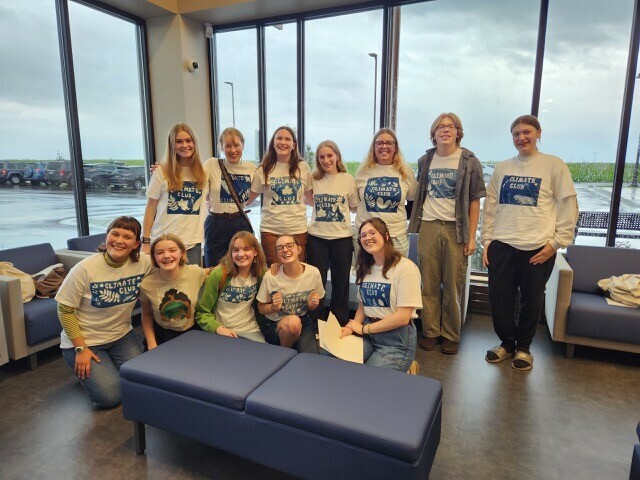News & Articles
Browse all content by date.

Several years ago a group of Duluth Public Schools students started their mission to incorporate solar on district buildings. This project began at Ordean East Middle School in 2018 when a group of students formed a climate club with a goal of working on projects to make theirschool more eco-friendly.
The group quickly realized they wanted to set their sights high – encouraging the district to opt into solar energy at Ordean East Middle School. This turned out to be no easy task.
“This project means so much to the students involved. Climate activism is so important to us and this project is a way to actually make a difference,” said Duluth Climate Club member Zoe Pierson.
The students’ original goal was to offset the energy used to light the gym at Ordean.
However with a lack of funding the project was shut down. With this disappointing loss, it seemed the project would never reach fruition.
Due to this setback, the students began to look for different ways to make this project happen. They discovered a grant proposal for Solar for Schools that was being debated by the Minnesota Legislature for the 2021-22 state budget. The Solar for Schools Grant would fund a major percentage of the money schools need to purchase solar panels. The students lobbied the state legislature for the funding and were successful.
The bill has since been included in the 2023-2024 budget. Since the bill was originally passed the Solar for School Grant has allowed 93 schools to pursue solar and another 60 school solar projects are pending.
With the potential funding, the Duluth Climate Club gained the momentum to continue with an even more ambitious project. Students at East and Denfeld are now actively working to get one megawatt of solar at Lincoln Park Middle School.
Though this project seems daunting, there’s a high likelihood that the cost will be greatly reduced and have minimal financial impact on the district.
As recognized by Amelia Gilbert, “We have the wonderful opportunity to offset some of our carbon footprint for cheap! If we were to turn down this opportunity we would be doing a disservice to future generations.”
Amelia Gilbert is a climate refugee from Texas who hopes to see Duluth hold up to its goals.
This is a project that has been six years in the making, starting when many of the students were in seventh grade! Recently, the Duluth Public Schools administration and School Board has chosen to buy in and explore the future of solar at the schools, which could mean that the project will finally gain some ground.
Out of the several editions of this project, this one is looking the most hopeful. The Climate Club’s request is for a one megawatt array at Lincoln Park Middle School. The array would cover 77% of the energy needs of Lincoln Park Middle School. In a broader picture, this array would cover about 10.6% of the district’s total energy needs, which would equate to $105,000 in savings each year.
Part of the reason this project is now so appealing to administration is there is so much funding. Both state and federal legislation will make it so this project is feasible.
The state funding, which is the Solar for Schools Grant, will cover 50% or up to $500,000 in each round of funding. Landmark federal legislation, called the Inflation Reduction Act (IRA) will cover an additional 40%-50% of the project’s original cost before the Solar for Schools Grant.
The funding provides such a great opportunity for students to connect with their community through renewable energy in a cost effective way.
Climate Club member, Kate Yapel, says that “Clean energy is our future. Duluth has the goal of being carbon neutral by 2050. Schools are a great place to start with this goal. By inspiring the younger generation to take stake in their future there will be amazing opportunities and activism that will spark change. We are asking leaders to accept the responsibility to do what’s best for the students and their future.”
Many of the current Climate Club members are going into their senior year or have now graduated. There are also many new members this time around with students from Denfeld and Ordean joining the project.
Because of this, the group has been able to expand their goals across a larger network of students and educators, showing a broad range of support for this project.
The group of students continue to work with district leadership.
“We are hopeful that the school district will approve the project.” said climate club member Mauren Pierson “We are also excited to see many adults and leaders in our community step up to the challenge of climate change, and are hopeful that more will. Already students all across the district have taken charge, done the research, and expressed their hopes of reducing carbon emissions in our city. This is the first step toward a better future for the planet.”
| Tweet |

